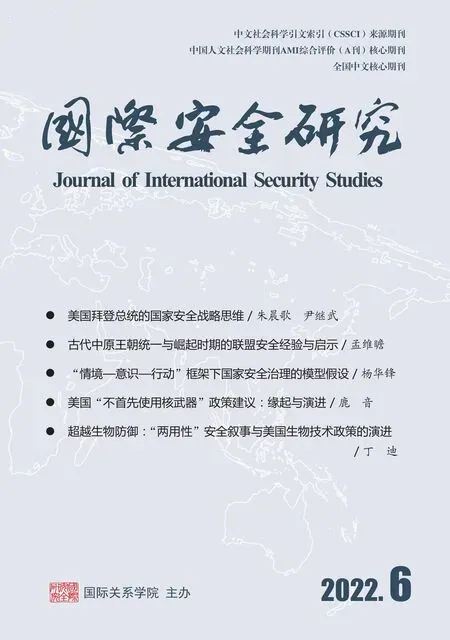国际安全研究2022年总目录
卷首语
[1.1] 新的起点 新的征程 陶 坚
总体国家安全观
[1.4] 对国家安全特点与治理原则的思考 贾庆国
安全理论
[1.26] 规则、关系与地区安全治理——以大湄公河次区域公共卫生协作治理为例 魏 玲 杨嘉宜
[1.49] “预防—震慑—应急”一体化:中国海外安保供给模式新探 王梦婷 余潇枫
[4.3] 广义安全论视域下国家安全学“再定位” 余潇枫 章雅荻
[4.32] 身份认同与社会性存在:中国国家本体安全的寻求与调适 邢瑞磊 周灏堃
[5.3] 国家安全学基础理论框架构建研究 李文良
[6.34] 古代中原王朝统一与崛起时期的联盟安全经验与启示 孟维瞻
[6.61] “情境—意识—行动”框架下国家安全治理的模型假设 杨华锋
热点聚焦
[1.73] 安全化操作与美国全球供应链政策的战略性调适 管传靖
[1.100] 美国全球供应链调整的国家安全逻辑及实现路径 李淑俊 王小明
[1.130] 数字经济时代的全球数据安全治理与中国策略 阙天舒 王子玥
[2.3] 美国国家安全战略视阈下的中美关系50年 达 巍 蔡泓宇
[2.47] 进攻性联盟、模糊性威慑与AUKUS的战略性扩 张兰江 姜文玉
[2.78] 《禁止核武器条约》之困境及出路 丁 伊
[3.3] 深度伪造与国家安全:基于总体国家安全观的视角 刘国柱
[3.32] 总体国家安全观视阈下的虚假信息研究 袁 莎
[4.65] 数字技术竞争与东亚安全秩序 孙学峰
[4.91] 霸权的逻辑:美国亚太安全战略的多边转向 凌胜利 王彦飞
安全战略
[3.57] “战略时间差”与中国的战略安全 胡 键
[3.79] 人工智能影响复合战略稳定的作用路径:基于模型的考察 蔡翠红 戴丽婷
[5.30] 从亚太到“印太”:美国地区安全战略的变迁与回归 樊吉社
[5.53] 美国对华常规威慑战略的调整 左希迎
[5.81] 美国对华拒止性威慑战略论析 陈 曦 葛腾飞
[6.3] 美国拜登总统的国家安全战略思维 朱晨歌 尹继武
安全议题
[3.109] 尊让与监督:美国防疫诉讼与公共卫生安全治理 陈长宁
[3.130] 美国国家安全人才培养与高等教育的融合——以国家安全教育立法及其实施为例 唐宇明
[4.127] 国门安全治理的跨界性:双层跨域治理框架 王菲易
[5.107] 国际安全视角下太空军控的缘起、演进和发展动向 徐能武 龙 坤 孟 鑫
[5.130] 自下而上的规范制定与网络安全国际规范的生成 王 蕾
[6.86] 美国“不首先使用核武器”政策建议:缘起与演进 鹿 音
[6.113] 超越生物防御:“两用性”安全叙事与美国生物技术政策的演进 丁 迪
区域与国别安全
[2.104] 复合身份政治:西亚大国参与阿富汗安全事务的三重维度 孙德刚 章捷莹
[2.132] 模糊盟友:联盟体系视角下的美国与土耳其关系 寿慧生 王倩楠
[1.159] 《国际安全研究》栏目调整和2022年度选题预告
[1.160] 《国际安全研究》2021年度匿名审稿专家名单
[6.155] 2022年中英文总目录
Table of Contents (2022)
[1.4] Reflections on Characteristics of National Security and Its Governance PrinciplesJIA Qingguo
[1.26] Rules, Relations and Regional Security Governance: A Case Study of Collaborative Governance of Public Health in the Greater Mekong SubregionWEI Ling and YANG Jiayi
[1.49] A More Integrated Mechanism of “Prevention- Deterrence -Emergency Response”: New Thinking on China’s Overseas Security Supply ModelWANG Mengting and YU Xiaofeng
[1.73] Securitization Practices and Strategic Adjustments in U.S.Policy on Global Supply ChainGUAN Chuanjing
[1.100] The Theoretical Logics and Implementation Paths of the U.S.Adjustment of Its Global Supply ChainLI Shujun and WANG Xiaoming
[1.130] Global Data Security Governance and Action Strategies for China’s Participation in the Era of Digital EconomyQUE Tianshu and WANG Ziyue
[2.3] China-US Relations in the Perspective of the US National Security Strategy: A 50-Year ReviewDA Wei and CAI Hongyu
[2.47] Offensive Alliance, Ambiguous Deterrence and AUKUS’s Strategic ExpansionLAN Jiang and JIANG Wenyu
[2.78] The Treaty on the Prohibition of Nuclear Weapons: Dilemmas and SolutionsDING Yi
[2.104] Complex Identity Politics: Three Dimensions of West Asian Powers’Participation in the Afghan Security AffairsSUN Degang and ZHANG Jieying
[2.132] Ambiguous Allies: The US-Turkey Relations from an Alliance PerspectiveSHOU Huisheng and WANG Qiannan
[3.3] Deepfakes and National Security: A Perspective from a Holistic Approach to National SecurityLIU Guozhu
[3.32] A Study on Disinformation from the Perspective of a Holistic Approach to National SecurityYUAN Sha
[3.57] Study on “Strategic Time Gap” and China’s Strategic SecurityHU Jian
[3.79] The Impact Path of Artificial Intelligence on Shaping the Composite Strategic Stability: A Model-Based ExaminationCAI Cuihong and DAI Liting
[3.109] Deference and Oversight: The Lawsuits Related to Pandemic Prevention and US Public Health Security GovernanceCHEN Changning
[3.130] The Integration of National Security Talent Training and Higher Education in the United States: A Case Study of the US National Security Education Legislation and Its Program ImplementationTANG Yuming
[4.3] Reorientation of National Security Studies under the Framework of the General Security TheoryYU Xiaofeng and ZHANG Yadi
[4.32] Identity and Social Existence: The Quest for China’s Ontological Security and Its AdaptationXING Ruilei and ZHOU Haokun
[4.65] Digital Technology Competition and East Asian Security OrderSUN Xuefeng
[4.91] Logic of Hegemony: The Multilateral Transformation of the US Asia-Pacific Security StrategyLING Shengli and WANG Yanfei
[4.127] The Transboundary Nature of National Gateway Security Governance: A Two-tier Governance FrameworkWANG Feiyi
[5.3] Research on the Construction of Basic Theoretical Framework for National Security StudiesLI Wenliang
[5.30] From Asia-Pacific to Indo-Pacific: The Evolution and Return of U.S.Regional Security StrategyFAN Jishe
[5.53] Adjustments to U.S.Conventional Deterrence Strategy toward ChinaZUO Xiying
[5.81] An Analysis of the U.S.Strategy of Deterrence-by-Denial against ChinaCHEN Xi and GE Tengfei
[5.107] Space Arms Control from the Perspective of International Security:Origin,Evolution and TrendXU Nengwu, LONG Kun and MENG Xin
[5.130] The “Bottom-up” Norm-setting and the Formulation of International Cybersecurity NormsWANG Lei
[6.3] Analysis of President Joseph Biden’s Strategic Views on National SecurityZHU Chenge and YIN Jiwu
[6.34] Alliance Management in the Unification and Rising Periods of China’s Ancient History: Experiences and InspirationsMENG Weizhan
[6.61] Model Hypothesis of National Security Governance under the “Situation-Consciousness-Action” FrameworkYANG Huafeng
[6.86] Policy Recommendations for the US Government Regarding the “No-First-Use” of Nuclear Weapons: Origin and EvolutionLU Yin
[6.113] Beyond Biodefense: “Dual-Use” Security Narrative and Evolution of US Biotechnology PoliciesDING Di

